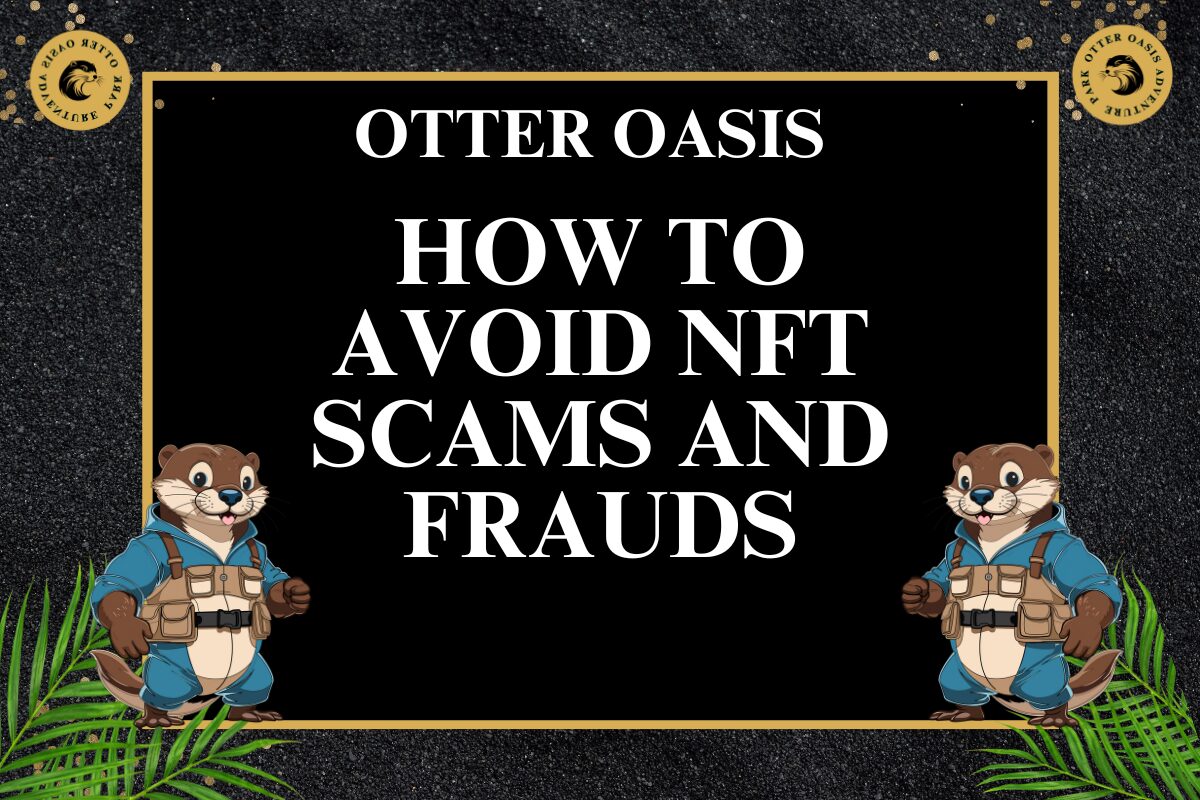How to Avoid NFT Scams and Frauds, begins with understanding the deceptive tactics used by scammers. Equipping yourself with verification strategies, and implementing robust security measures to protect your digital assets. With the rapid growth of the NFT market, opportunistic fraudsters have devised increasingly sophisticated schemes to exploit unsuspecting investors and collectors. From phishing attacks and counterfeit NFTs to rug pulls and wallet hacks, scams in the NFT space are becoming more prevalent, making it essential for participants to stay informed and proactive.
Scammers often prey on new and inexperienced users who may not be familiar with blockchain technology, smart contracts, or the verification processes necessary to distinguish genuine NFTs from fraudulent ones. Fake NFT projects, misleading promotions, and phishing sites disguised as legitimate marketplaces are just a few of the ways bad actors manipulate buyers into making costly mistakes. Without proper knowledge and due diligence, investors can lose significant amounts of money in these deceptive schemes.
To mitigate these risks, it’s crucial to conduct thorough research before making any NFT purchase. This includes verifying the authenticity of sellers and creators, using only reputable NFT marketplaces, and checking the metadata of an NFT through blockchain explorers. Additionally, securing your digital wallet, enabling two-factor authentication, and never sharing your private keys or seed phrases are fundamental steps in protecting your investments.
Understanding common scam tactics, recognizing red flags, and staying up-to-date with the latest security measures will empower you to navigate the NFT space safely. By educating yourself and leveraging trusted communities and resources, you can confidently participate in the NFT market while minimizing the risks of fraud.
How to Avoid NFT Scams and Frauds, from Phishing to Fake Marketplaces

Scammers use various tactics to deceive NFT investors, often leveraging the anonymity and decentralized nature of blockchain technology to execute fraudulent schemes. As the NFT space continues to grow, these scams have become increasingly sophisticated, making it crucial for buyers and investors to recognize common red flags and take proactive security measures.
Phishing Scams: A Threat to Your Digital Assets
One of the most prevalent NFT scams is phishing, where attackers pose as trusted platforms, influencers, or NFT marketplaces to steal users’ sensitive information. Scammers typically send fraudulent emails, direct messages, or pop-up notifications containing links that redirect unsuspecting victims to fake websites. These websites often look identical to legitimate platforms, prompting users to enter their wallet seed phrases or private keys, which are then compromised.
A more advanced version of phishing occurs through fake wallet connect prompts. Scammers create malicious pop-ups that mimic MetaMask or other digital wallets, tricking users into signing transactions that grant the attacker access to their funds. To avoid falling victim to phishing:
- Always double-check website URLs before entering credentials. Scammers often use subtle variations of legitimate domain names (e.g., "Opensea.io" vs. "0pensea.io").
- Never click on random links received via email, social media, or Discord, even if they appear to come from a verified account.
- Use browser extensions like MetaMask’s phishing detector to block suspicious websites.
- Bookmark official NFT marketplaces and access them directly instead of relying on links shared by others.
Fake NFT Marketplaces: Counterfeit Platforms Designed to Steal Your Funds

Another common scam is fake NFT marketplaces, which are designed to lure investors into purchasing counterfeit or nonexistent NFTs. These fraudulent platforms mimic real marketplaces like OpenSea, Blur, or Rarible, often featuring collections that appear identical to well-known projects. Scammers use fake verification badges, stolen artwork, and fake reviews to deceive buyers into thinking they are making legitimate purchases.
In some cases, these fake marketplaces do not actually sell NFTs at all. Instead, they prompt users to connect their wallets and approve malicious transactions, which drain funds from their accounts. Some warning signs of fake NFT marketplaces include:
- Unusual pricing – If an NFT’s price seems significantly lower than its market value, it may be a scam.
- Lack of community presence – Legitimate NFT projects have active communities on Discord, Twitter, and other social platforms. If you can’t find discussions about the marketplace, proceed with caution.
- Suspicious contract approvals – If a marketplace asks for unlimited spending approval on your wallet, it could be an attempt to drain your funds.
To stay safe, only use well-known and verified NFT marketplaces, and cross-check contract details on blockchain explorers like Etherscan before approving any transactions.
Rug Pulls: When NFT Creators Disappear Overnight

Rug pulls are among the most devastating NFT scams, where developers create an NFT project, generate hype, collect funds from buyers, and then suddenly abandon the project—disappearing with all the money. Unlike phishing scams that target individual users, rug pulls affect entire communities, leaving investors with worthless assets.
Rug pulls often come in different forms:
- Disappearing Founders – Developers delete their social media, Discord servers, and website after selling NFTs.
- Fake Utility Promises – Projects claim they will offer staking, play-to-earn features, or exclusive perks, but never deliver.
- Liquidity Removal – If an NFT project launches its own token alongside the collection, the team may drain liquidity from the token pool, crashing its value.
To avoid rug pulls:
- Research the team behind the project – Anonymous developers can be a red flag. While some legitimate projects have anonymous teams, most reputable NFT collections have founders with a public track record.
- Check for smart contract audits – A project with an audited smart contract ensures that there are no hidden backdoors allowing developers to exploit investors.
- Evaluate the roadmap realistically – If an NFT project promises massive rewards or unrealistic future milestones, it may be a scam.
By staying informed and conducting due diligence before investing, you can significantly reduce the risk of falling victim to NFT scams. Always remain skeptical of offers that seem too good to be true and prioritize security over hype.
Essential Steps on How to Avoid NFT Scams and Frauds by Verifying the Authenticity of NFTs Before Purchase
Protecting Your Digital Wallet: Best Practices on How to Avoid NFT Scams and Frauds Against Unauthorized Access

Your NFT wallet is your most valuable asset, and protecting it should be a top priority. Start by using a hardware wallet like Ledger or Trezor, which stores private keys offline, preventing hacking attempts.
Enable two-factor authentication (2FA) for added security. This extra step ensures that even if someone acquires your password, they can’t access your account without the 2FA code.
Never share your seed phrase with anyone, and beware of scam messages asking for it. No legitimate platform will ever ask for your private keys.
Additionally, disconnect unused wallet connections from websites you no longer interact with. This minimizes potential exploits from compromised platforms.
Understanding 'Rug Pulls': How to Avoid NFT Scams and Frauds by Identifying Red Flags in NFT Projects
Rug pulls are a major concern in the NFT space. These scams involve project founders suddenly abandoning their project after raising funds, leaving investors with worthless assets.
To avoid falling victim, analyze the team behind the project. If the founders remain anonymous or have no verifiable background in crypto, proceed with caution.
Another warning sign is overpromised returns. If an NFT project guarantees unrealistic profits, it’s likely a scam. Legitimate projects never promise financial gains.
Check the smart contract for suspicious code. If the contract allows developers to alter ownership rules or withdraw all funds, it's a red flag. Audited contracts from reputable security firms add credibility.
Staying Informed: Resources and Communities Dedicated to NFT Security.
Staying informed about NFT scams is crucial for protecting your investments. Follow trusted crypto security platforms like CertiK, SlowMist, and PeckShield, which regularly report scam alerts.
Engage with NFT communities on Twitter, Telegram. These communities share real-time scam warnings and help newcomers navigate the space safely. Subscribe to NFT security blogs and newsletters. Websites like CoinDesk, Decrypt, and NFT Evening provide updates on new threats and best practices.
By staying educated and vigilant, you can confidently navigate the NFT market while avoiding scams and fraudulent activities.
Conclusion: Safeguarding Your NFT Investments in a Rapidly Evolving Market
How to Avoid NFT Scams and Frauds is not just about recognizing red flags—it’s about adopting a proactive, security-first mindset that keeps your digital assets protected in a rapidly evolving industry. As NFTs continue to grow in popularity, so too do the tactics of scammers looking to exploit unsuspecting buyers and investors. From phishing scams and fake marketplaces to rug pulls and counterfeit NFTs, bad actors use various methods to take advantage of those who are unfamiliar with the risks associated with digital ownership.
By educating yourself and following best practices
You can significantly reduce your chances of falling victim to NFT fraud. This starts with verifying the authenticity of NFTs before purchasing, ensuring that you are buying from reputable marketplaces, researching creators, and cross-checking metadata using blockchain explorers like Etherscan or BscScan. It’s equally important to protect your digital wallet—storing assets securely in hardware wallets, enabling two-factor authentication (2FA), and never sharing private keys or seed phrases.
Understanding rug pulls and their warning signs can prevent major financial losses, as many fraudulent projects lure investors with unrealistic promises and fabricated hype. Always investigate project roadmaps, scrutinize developer transparency, and look for independent security audits before making a financial commitment. If a project lacks clear leadership or is shrouded in secrecy, it’s best to approach with caution.
Additionally, staying informed and engaging with trusted NFT Project.
Communities can be one of your greatest defenses against scams. Platforms like Twitter, Discord, and Reddit serve as valuable hubs where collectors, investors, and security experts share real-time alerts about emerging frauds. Following crypto security firms such as CertiK, SlowMist, and PeckShield can keep you updated on potential threats within the NFT space.
In the end, the NFT market offers incredible opportunities for artists, collectors, and investors, but only those who take the necessary precautions can navigate it safely. As with any investment, due diligence is key. If a deal seems too good to be true, it probably is. By remaining skeptical of suspicious offers, prioritizing security, and leveraging the right tools and communities, you can confidently explore the world of NFTs while minimizing the risks of fraud.
The more you educate yourself and adopt strong security practices, the safer your NFT journey will be. Stay vigilant, trust verified sources, and always think before you click. A cautious investor is a protected investor.
Follow us - Twitter
join our - Telegram group
Thanks for visiting Otter Oasis Today, great to have you here reading our post. Please feel free to take a look around and engage with us..




